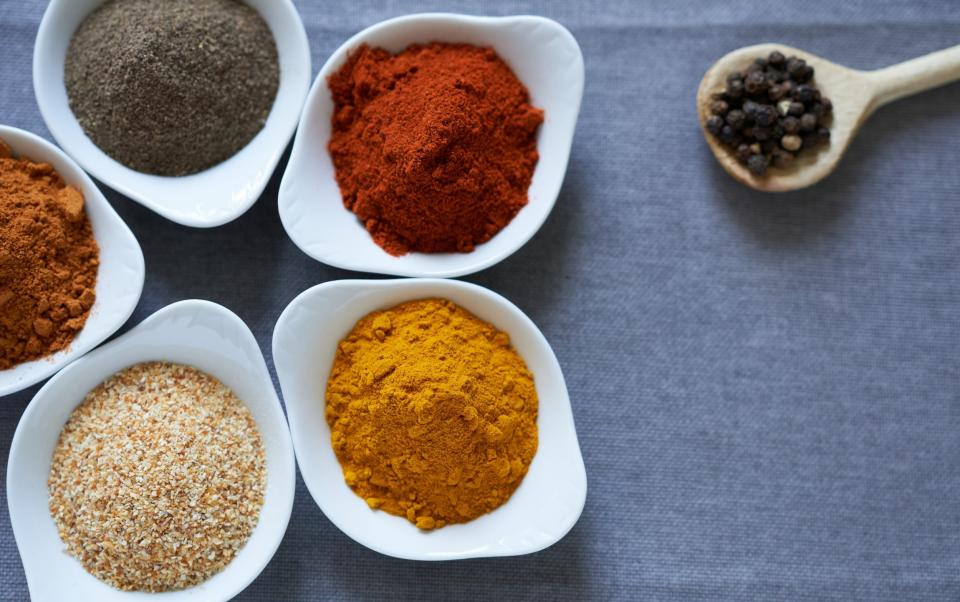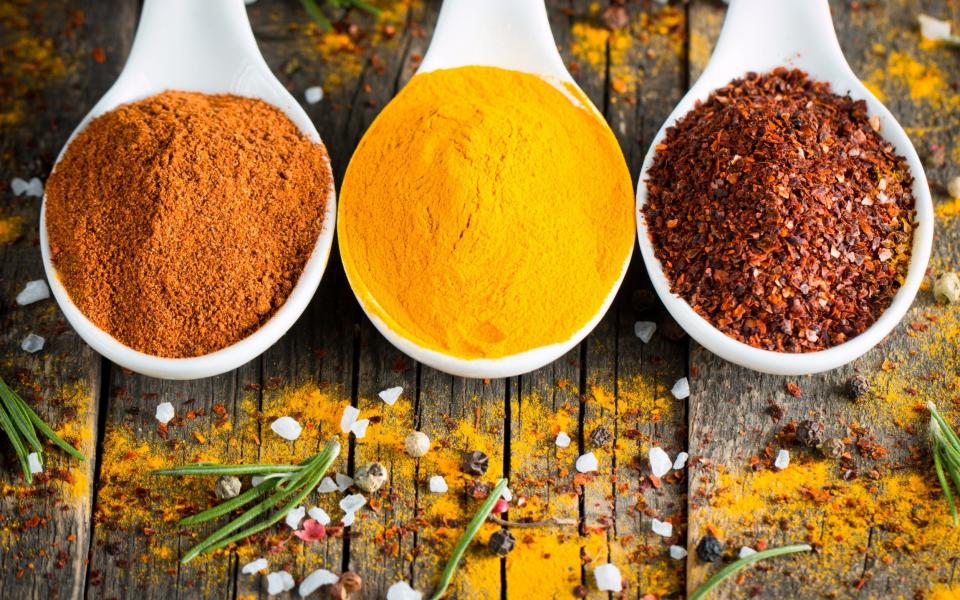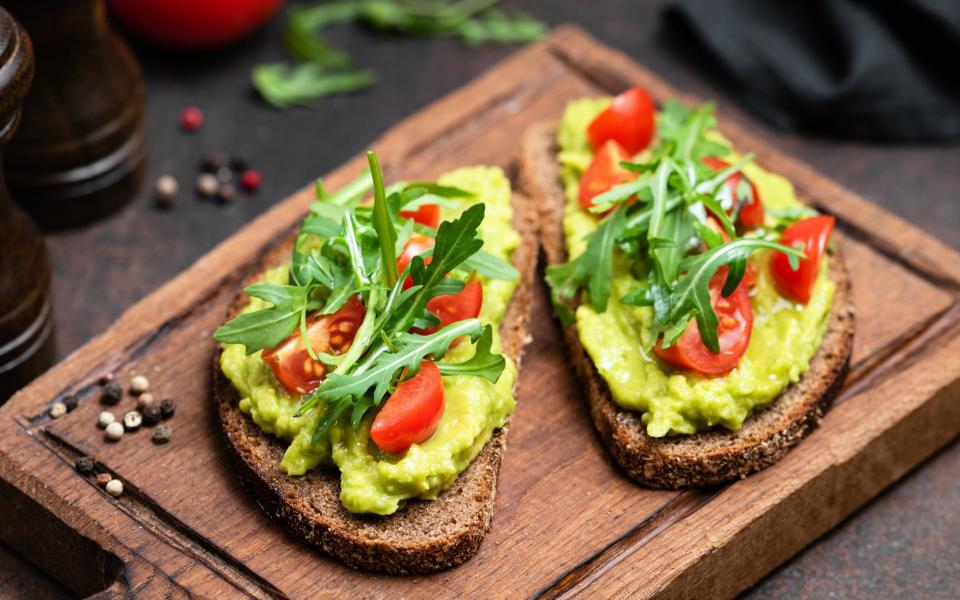Six easy ways to improve your gut health

Our gut bacteria play an important role in keeping us healthy. Aside from extracting nutrients from food, the microbes in our digestive tract support our immune system and protect us from harmful bugs.
We’re often told to eat more fermented foods, such as kimchi (fermented cabbage) and kefir (fermented milk), but there are other, easier ways to nurture your gut bacteria and improve your gut health …
Pop some peanuts

If you eat peanuts regularly then your gut is likely to be rich in Ruminococcaceae, a group of bacteria linked to healthy liver metabolism and immune function.
A new study published in the journal Clinical Nutrition found that a daily 1oz (28g) snack of peanuts increased the levels of this important bacteria in the gut, compared with a higher carbohydrate snack of cheese and crackers.
Of course, you can munch peanuts straight from the packet, but this tasty trail mix is a little more exciting and also includes heart-healthy walnuts, Brazil nuts and decadent dark chocolate. Combine 75g roasted peanuts, 50g walnut pieces, 25g chopped Brazil nuts and 50g good quality dark chocolate chips in an airtight container. A portion size is around 30g, 175 calories, or a small handful, and the mix will keep for several weeks.
Spice things up

Science is now catching up with the cooking traditions of India and parts of South East Asia, where the health benefits of herbs and spices have long been recognised. In a study from Penn State University’s department of nutritional science, participants were given blends of herbs and spices – such as cinnamon, ginger, cumin, turmeric, rosemary, oregano, basil and thyme – in various doses. After four weeks, participants showed an increase in gut bacteria diversity. The effect was particularly evident in those on higher doses of ¾ to 1½tsp per day.
Adding herbs and spices to your meals is great, but they can degrade if kept too long, or if not stored properly. The shelf-life for herbs and spices varies; the best way to tell if they are still good is to give them a sniff – if they don’t have much aroma, chances are they won’t taste of much either, nor will they have the potency to deliver maximum health benefits. Keep them in airtight containers in a dark cool place, away from any heat sources.
Eat more prebiotic foods

Prebiotic foods like mushrooms, onions, garlic, asparagus, leeks, apples and wholegrains contain a kind of soluble dietary fibre that serves as a food source for our gut bacteria, leading to a healthier digestive system.
A great lunch option is to make a batch of gut-healthy, prebiotic-rich soup. Using a food processor, finely chop a peeled onion and a large leek (ends removed). Place a large saucepan on a medium heat, add 1 tbsp olive oil, then tip in the onion and leeks and sauté gently for two to three minutes. Now chop 125g asparagus and one courgette, both with the ends removed, in the food processor and add to the pan.
Stir all the vegetables together and sauté for a further two to three minutes. Add 800ml vegetable stock made from two cubes and a 250g pouch of pre-cooked mixed grains to the pan and stir well. Season with salt and pepper, bring to the boil then turn down and simmer for 20 minutes. Finally, add the juice of a lemon and serve.
Extra virgin olive oil is good for guts too

Is there nothing this wonder oil cannot do? Emerging research shows that the health-promoting benefits of extra-virgin olive oil may also extend to the gut microbiome. Early indications are that it reduces the incidence of harmful bacteria and stimulates the growth of beneficial bacteria – all good news for our guts.
No doubt you are already using extra-virgin olive oil in salad dressings, but why not swirl some into soup, add a spoonful to your morning smoothie, drizzle over toast instead of butter or make a simple tomato bruschetta for lunch. Mix together 4 tbsp extra-virgin olive oil, 2 cloves thinly sliced garlic, 4 large ripe tomatoes and a small handful of finely sliced basil leaves. Season well and leave to macerate for 10 minutes or so. Serve on top of thinly sliced, toasted bread.
Include at least two plant foods at each meal

Eating a wide variety of plant foods is key when it comes to gut bacteria diversity but it can be easy to get into a fruit and veg rut, buying and eating the same things week in, week out. A little rule of thumb that can help is to eat at least two different plant foods at each meal. How might this look?
Breakfast: try some plain Greek yogurt with chopped fresh fruit and a sprinkle of nuts and seeds, or wholegrain toast with sliced avocado and tomato.
Lunch: make a simple tuna and bean salad by mixing together a can of mixed beans, a can of tuna, some sliced red onion and chopped veg such as cucumber, red pepper and carrot. Dress with 1 tsp olive oil and a squeeze of lemon juice. Serve with wholegrain crackers.
Dinner: combine multiple vegetables to create a more interesting side dish. For example, stir-fry some green beans, mange tout and asparagus in a little olive oil with a couple of cloves of finely sliced garlic.
Have some dark chocolate and a little red wine

Both red wine and dark chocolate contain compounds called polyphenols, which, according to renowned gut health expert Prof Tim Spector “are like rocket fuel for your gut microbes”. But note, we are talking about one small glass of red wine and a couple of squares of dark chocolate of at least 70 per cent cocoa solids. More than this and the health benefits start to be outweighed by the negative effects of the alcohol and sugar they contain.
For a healthy treat make a batch of these chocolate orange energy bites. Place 200g pitted dates, 2 tbsp fresh orange juice, 1 tsp orange zest, 2 tbsp desiccated coconut and 2 tbsp ground almonds in a food processor. Whizz to form a stiff dough. Form into 3cm balls and then roll to coat in unsweetened cocoa powder. Chill before eating. Will keep for up to a week in the fridge in an airtight container.

